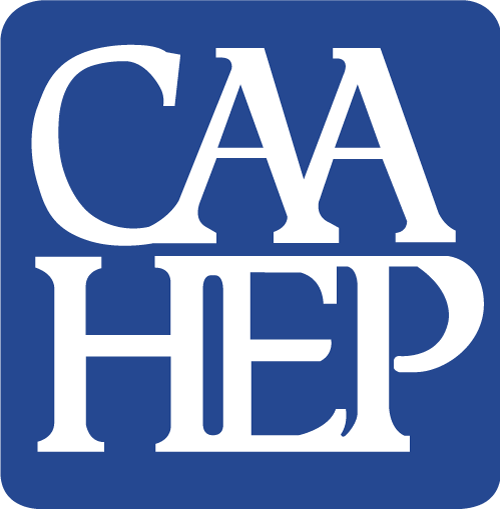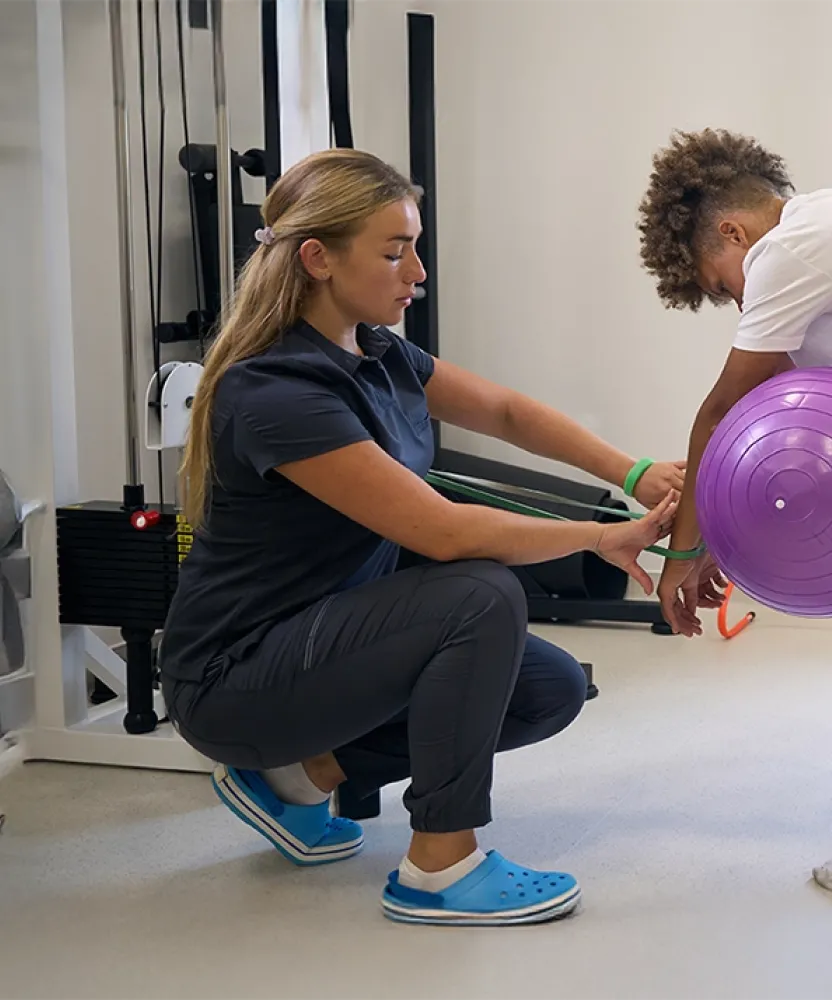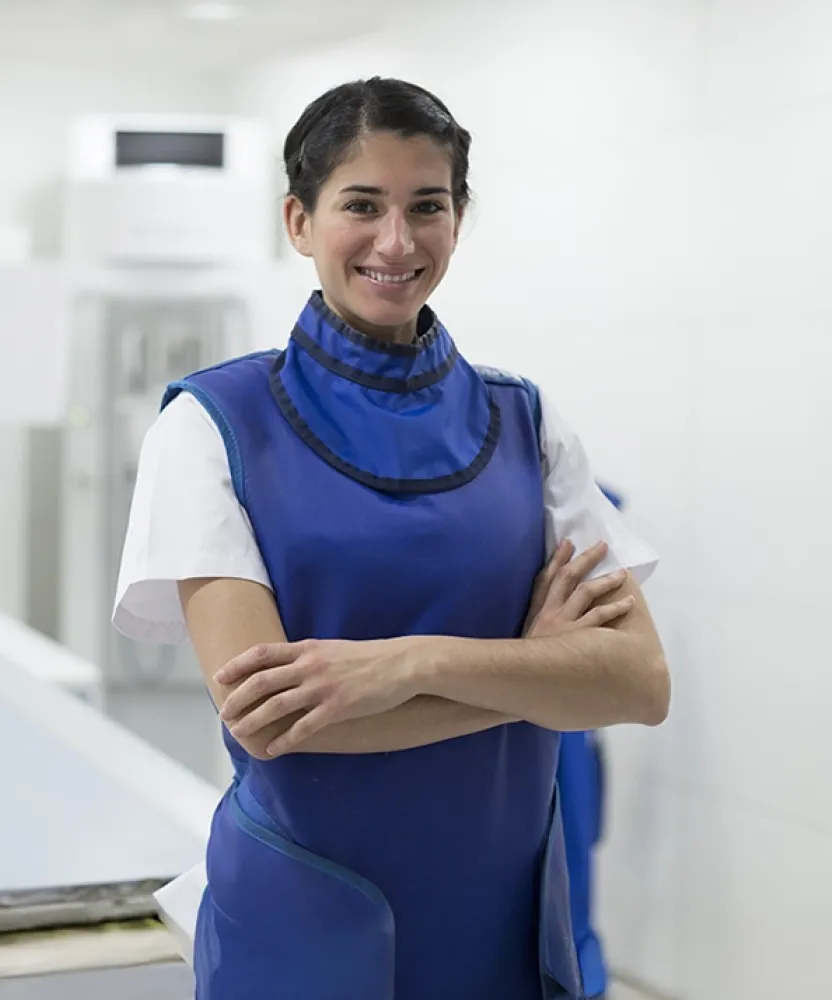Your new career as a surgical technologist IS possible.
| Accreditation | CAAHEP accredited,1 Accredited by the Higher Learning Commission |
|---|---|
| Transfer credit | Transfer up to 45 approved credits |
| Hybrid format | Online didactic courses + on-campus labs at our New Orleans Campus and clinical experiences at local clinical sites |
| Eligibility | Students must have first completed the Herzing Diploma in Sterile Processing Program or equivalent |
| QuickPaths | Discover pathways to continue advancing your education (BS, MS) |
Learn More Today!
Residents of Louisiana are eligible to apply.
Overview: Associate of Science in Surgical Technology
The Associate of Science in Surgical Technology is a 60-credit undergraduate program which prepares you for a career as a surgical technologist. The online degree program provides students with fundamental knowledge and skills in surgical pharmacology, surgical principles and practice, surgical procedures, and much more. Students will complete their lab experiences at our New Orleans Campus and clinicals at a local clinical site.
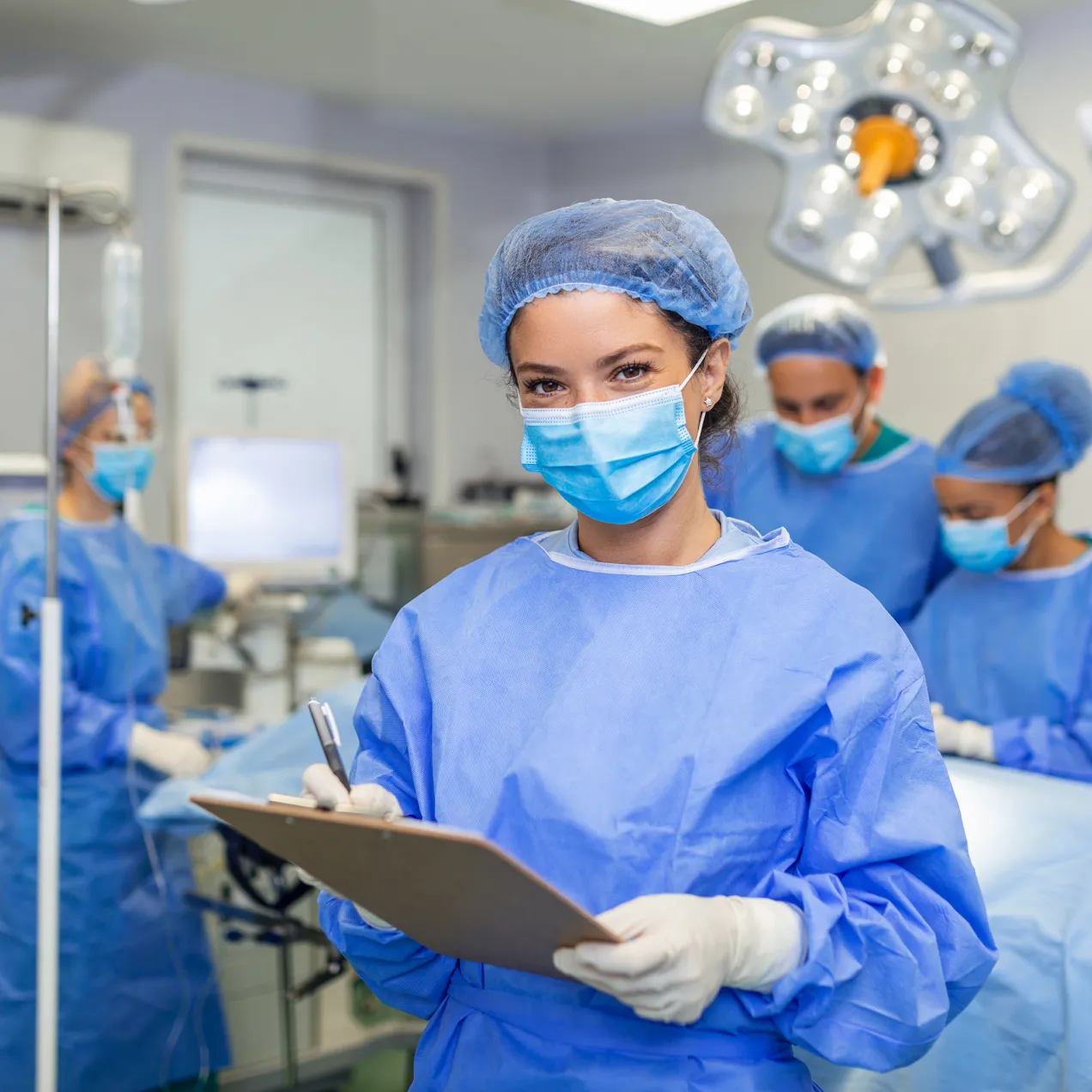
Career-focused curriculum
Discover the crucial knowledge and skills required to succeed in your work and build a foundation for continued career growth.
Find your balance
Hybrid delivery helps you maintain school-life balance, designed to be as flexible as possible for busy non-traditional students.
Virtual services
Access to extensive virtual services, including academic advising, tutoring, support services, technical support and library services.
Lifelong support
We support your ongoing career advancement by providing comprehensive, personalized student services with lifelong career coaching.
Classes, program length and curriculum details
As a student in Herzing's Surgical Technology program, you'll be prepared with the skills needed to work effectively as an integral part of a surgical team.
The coursework includes anatomy and physiology, microbiology, medical terminology, in addition to core surgical technology classes.
At the end of the core classes you will complete 450 hours of hands-on practice at clinical sites for 24 weeks and sit for the Certified Surgical Technologist exam.
Upon successful completion of the program, you'll be prepared for entry-level surgical technology positions in the operating room or other surgical healthcare settings.
| Program | Months i | Semester Credits |
|---|---|---|
| Associate of Science in Surgical Technology | 16 | 60 |
i. Average number of months for students to complete program
Required Courses
All courses, 33.00 semester credit hours, are required.
Special Grading Requirements for Surgical Technology Courses
All Surgical Technology courses must be completed with a grade of "C" (76%) or better for a student to be continued in the Surgical Technology program.
Required Courses in General Education
Students enrolled in this associate degree must complete a minimum of 25.00 semester credit hours in general education distributed among the following disciplines. The Herzing University General Education offerings are listed below. Refer to the General Education section of this catalog for Herzing University courses that would satisfy these requirements. 9.00 Semester Credit Hours in Communications EN 104 English Composition I EN 111 Information Literacy EN 116 Speech 3.00 Semester Credit Hours in Humanities HU 140 Cultural Diversity 3.00 Semester Credit Hours in Mathematics MA 109 College Algebra 7.00 Semester Credit Hours in Science SC 144 Introduction to Anatomy and Physiology SC 166 Microbiology 3.00 Semester Credit Hours in Social and Behavioral Sciences PS 101 Psychology Special General Education Grading Requirements for Surgical Technology Support Courses The following general education courses must be completed with a grade of "C" (70%) or better for a student to be continued in the Surgical Technology program: SC 144 Introduction to Anatomy and Physiology MA 109 College Algebra All other general education courses must be passed with a grade of "D" (60%) or better to be continued in the Surgical Technology program. A student who is dropped from the program for failing to achieve the minimum grade specified in the general education courses, but who otherwise meets the academic standards of the University, may transfer to another Herzing degree program and/or may reapply to the Surgical Technology program in a future semester.
Personal and Professional Development Courses
2.00 semester credit hours are required.
Distribution of Contact Hours by Course
Distribution of Contact Hours by Course Course Lecture Hours Lab Hours Clinical Hours Total Contact Hours Credits HC 101 15.00 0.00 0.00 15.00 1.00 ST 115 30.00 0.00 0.00 30.00 2.00 ST 120 30.00 30.00 0.00 60.00 3.00 ST 125 15.00 30.00 0.00 45.00 2.00 ST 130 45.00 0.00 0.00 45.00 3.00 ST 135 15.00 0.00 0.00 15.00 1.00 ST 140 15.00 60.00 0.00 75.00 3.00 ST 205 0.00 90.00 0.00 90.00 3.00 ST 215 0.00 90.00 0.00 90.00 3.00 ST 225 0.00 0.00 135.00 135.00 3.00 ST 235 0.00 0.00 135.00 135.00 3.00 ST 245 0.00 0.00 180.00 180.00 4.00 ST 255 30.00 0.00 0.00 30.00 2.00 PD 121 15.00 0.00 0.00 15.00 1.00 PD 202 15.00 0.00 0.00 15.00 1.00 Gen Ed - Communications 135.00 0.00 0.00 135.00 9.00 Gen Ed – Humanities 45.00 0.00 0.00 45.00 3.00 Gen Ed – Mathematics 45.00 0.00 0.00 45.00 3.00 Gen Ed - Science 75.00 60.00 0.00 135.00 7.00 Gen Ed – Social and Behavioral Sciences 45.00 0.00 0.00 45.00 3.00 Totals 570.00 360.00 450.00 1380.00 60.00
Tuition & Cost
Tuition & Cost
The cost of tuition for the Associate of Science in Surgical Technology program is $530 per credit.
You can potentially earn even greater savings by transferring credit from prior college coursework, applying for financial aid, or potential partnership opportunities through your employer.
Our goal is your career advancement. That's why we are always working to improve our curriculum and processes to make our program as affordable as possible while preparing you best for success in your work.
Scholarships & Financial Aid
You may be eligible for multiple scholarships and grants, both through Herzing University and several national scholarship websites.
Military/Veteran Discounts
Veterans, Active Duty U.S. Servicemembers, and spouses may qualify for a 10% tuition discount or tuition reduction to $250 per credit.
How to become a surgical technologist
Earning an associate degree in surgical technology is considered the preferred educational model for entry-level positions by the Associate of Surgical Technologists (AST).
- Earn your high school diploma, GED or equivalent
- Complete the Herzing Diploma in Sterile Processing Program or equivalent
- Enroll in the Surgical Technology program and earn your degree
- Get certified by passing the Certified Surgical Technologist (CST) examination
- Find your first job as a surgical technologist!
By successfully completing Herzing's online CAAHEP-accredited1 surgical technologist degree program, you'll be prepared to work in this growing profession and be an essential part of the healthcare team. You will also be required to take the certified surgical technologist (CST) examination offered by The National Board of Surgical Technology and Surgical Assisting.
Accreditation
Our accredited Surgical Technology program
We strive to earn rank as one of the top private, nonprofit universities in the United States. Just as you work every day to become the best version of yourself, so do we as a university.
We are proud to have attained institutional accreditation, as well as programmatic accreditation for our Surgical Technology program.
✝The Associate of Science in Surgical Technology program at Herzing University is accredited by the Commission on Accreditation of Allied Health Education Programs (www.caahep.org) upon the recommendation of the Accreditation Review Council on Education in Surgical Technology and Surgical Assisting (ARC/STSA). Herzing University is approved to offer programs in an online learning modality through association with the main campus in Madison, Wisconsin..
Herzing University is institutionally accredited by the Higher Learning Commission (hlcommission.org), a regional accreditation agency recognized by the U.S. Department of Education.
Waived Enrollment Fee
Discover the educational pathway designed to maximize your career potential. Reach for greater heights with Herzing University.
Faq
Frequently Asked Questions
Didn't find the answer to your question? Send us an inquiry and we will be happy to answer all your questions!
Here is the primary general distinction:
- Sterile Processing Technicians are responsible for sterilizing equipment needed for medical procedures. Their duties are primarily outside of the operating room; however, their job function is critical to the operating room.
- Surgical Technologists are responsible for aseptic technique, understanding surgical procedures and instruments, maintaining the sterile field, passing instruments during the sequence of the procedure, as well as many other duties. They function as the masters of aseptic technique in the operating room.
Job titles, duties and responsibilities can vary between different healthcare institutions. Different states might have their own unique restrictions for who is qualified to handle what responsibilities. Some states require that the surgical technologist have a current certification for employment. Some surgical technologists handle the sterilization of equipment as well.
Earning your associate degree and becoming a certified surgical technologist is your ticket to becoming an indispensable member of a surgical team, handle many different types of tasks and become highly valuable to employers.
According to the Bureau of Labor Statistics (BLS), the average salary for surgical technologists in Louisiana is $53,990 per year ($25.96 per hour).* Pay depends largely on where you work, the type of healthcare institution you work for, your education and level of experience. Keep in mind this is not an entry-level salary; you will need to work towards this level of pay.
Surgical Technologists are also cross trained for several different departments related to surgery, and also have the option of over-time pay, and shift differential. Additionally, many of our affiliate hospitals offer tuition reimbursement for employees, enabling the surgical technologist to advance their education.
Are surgical techs in high demand?
As the number of surgeries increases to meet the needs of our aging population, so will the career opportunities for surgical technologists. The BLS projects a 5% increase in demand nationwide for surgical technologists from 2024-2034.*
Before an operation, surgical technologists help prepare the operating room by setting up surgical instruments and equipment, sterile drapes, and sterile solutions. They also get patients ready for surgery as well as pass instruments and other sterile supplies to surgeons and surgeon assistants during surgery.
Surgical technologists advance by specializing in a specific area of surgery, such as neurosurgery or open-heart surgery.
- Certified surgical technologists with additional specialized education or training also may act in the role of the surgical first assistant or circulator. The surgical first assistant, as defined by the American College of Surgeons (ACS), provides aid in exposure, hemostasis (controlling blood flow and stopping or preventing hemorrhage), and other technical functions under the surgeon’s direct supervision, assisting with a safe operation.
- A circulating technologist is the “unsterile” member of the surgical team who interviews the patient before surgery, prepares the patient, helps with anesthesia, obtains and opens packages for the “sterile” people to remove the sterile contents during the procedure, keeps a written account of the surgical procedure, and answers the surgeon’s questions about the patient during the surgery.
- Some surgical technologists manage central supply departments and sterile processing instrument departments in hospitals, work as private scrubs for surgeons, work in tissue retrieval and procurement, are employed as sales representatives for medical device manufacturers, teach and direct in surgical technology programs in colleges and universities, or take positions with insurance companies.
Get a preview of the career and walk through the day in the life of a surgical tech.
The surgical technology associate degree program takes about 16 months to complete on average, meaning you can earn your degree and start your new career in less than 2 years.
There are many unique job titles within surgical technology. Going back to school and earning your associate degree gives you further opportunity to climb the career ladder in the operating room. Potential job titles could include:
- Surgical Technologist
- Surgical Technician
- Scrub Tech
- Operating Room Technician
- Operating Room Assistant
Note: Becoming a “Surgical Assistant” requires additional education and is not within the surgical technology scope of practice. A surgical tech program does not offer surgical assistant training.
Healthcare institutions may have their own conventions for how positions are titled, the education/certification they require, and the specific roles and responsibilities assigned to each.
Earning your associate degree in surgical technology from Herzing University provides the education you need to thrive as a surgical technologist and carve your own unique career path in the OR.
Our program features online coursework with some required on-campus labs. The program cannot be completed 100% online, but online coursework is a significant part of the program. Becoming a certified surgical technologist requires hands-on training to be able to excel in the day-to-day requirements of the job.
With an associate degree in surgical technology, you can expect to work in a hospital, outpatient care center, privately for a surgeon, or ambulatory surgical facility. Typically, surgical technologists work a regular 40-hour week, although you could be on call or work nights, weekends and holidays on a rotating basis.
As a graduate of our program, you will be prepared for an entry-level career as a surgical tech in hospitals, clinics and other healthcare facilities.
Complex math isn’t part of the day-to-day for the typical surgical technologist. Simple calculations or unit conversion may be required, but no further advanced math skills will be commonly needed.
There is a 3 credit hour general education requirement for mathematics as part of the Herzing surgical technology program.
Go back to school and start a new career in healthcare
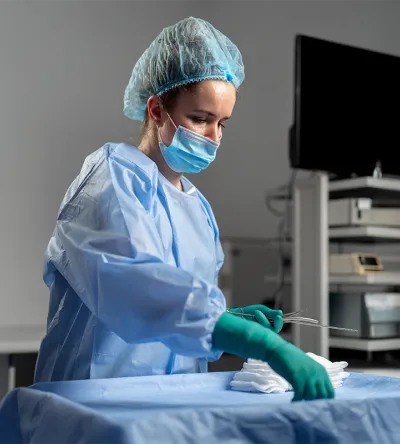
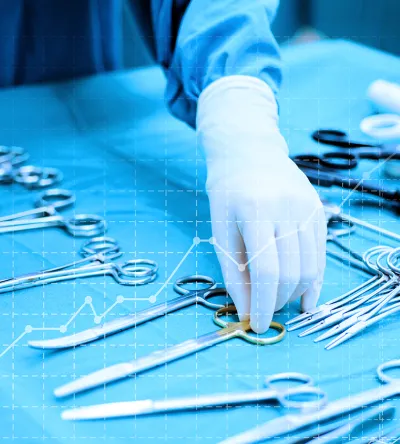
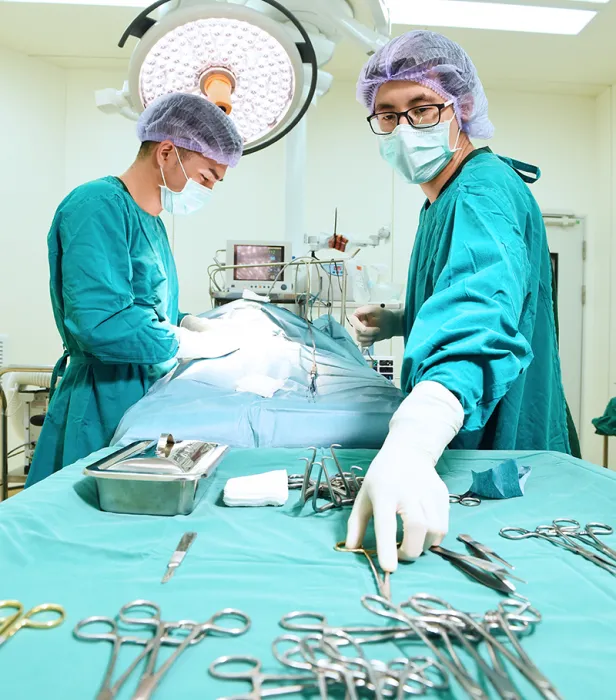
Also called surg techs, scrubs, and surgical or operating room technicians, surgical technologists work under the supervision of registered nurses, creating and maintaining the sterile field, passing instruments, holding retractors, cutting sutures and help count sponges, needles, supplies, instruments and more. A career as a surgical technologist could be right for you if you:
- Are well organized and detail oriented
- Are not squeamish about watching surgery and being expose to blood and other bodily fluids, as well as smells
- Have good hand-eye coordination
- Work well in a team
- Work well under pressure
- Can quickly respond to multiple requests
- Can communicate clearly and concisely
- Have discipline, concentration and stamina
Graduates from surgical technology programs like Herzing’s are members of operating room teams, consisting of surgeons, anesthesiologists, and circulating nurses. Potential job titles include Surgical Technologist, Lead Surgical Technologist, Travel Surgical Technologist and Material Manager.
The Student Experience at Herzing
If you have an interest in changing careers, the time is never too late. Being prepared is the key and Herzing can help you achieve that.
Michelle Wilton
Healthcare Student | Orlando CampusI initially chose to get my degree in Surgical Technology because I’ve always watched and enjoyed surgical shows. I knew they were different from working in real life, but they gave me the initiative to try. After the first surgery I scrubbed in on, I knew that I had made the right decision coming here. I was so comfortable and felt like I was exactly where I wanted to be.
Dakota Stamant
Healthcare Student | New Orleans CampusMy advice: Be patient with yourself and don’t get discouraged.
Stephanie Reeck
Healthcare Student | Online CampusHerzing’s surgical technology program prepares you for entry-level positions in the operating room. That was exactly what I was looking for in a healthcare career – the chance to help save and change lives.
Trisha Warner
Healthcare Student"The economy started to tank and I lost my job. My son had some extensive medical bills as well. You can either go sideways, down or up. I chose to go up and enrolled at Herzing."
James Nevel
Healthcare StudentRecent Blog Posts
Disclosures
* BLS pay estimates calculate the median annual wage for various occupations. Per the BLS the median wage for an occupation is: "The wage at which half of the workers in the occupation earned more than that amount, and half earned less. Median wage data are from the BLS Occupational Employment and Wage Statistics survey." Bureau of Labor Statistics (BLS), U.S. Department of Labor, Occupational Outlook Handbook 2024. BLS median wage estimates do not represent entry-level wages and/or salaries. Multiple factors, including prior experience, age, geographic market in which you want to work, and degree level and field, will affect career outcomes, including starting salary and earnings as an experienced employee. Herzing neither represents that its graduates will earn the median salaries calculated by BLS for a particular job nor guarantees that graduation from its program will result in a job, promotion, particular wage or salary, or other career growth.
Waived Enrollment Fee
Discover the educational pathway designed to maximize your career potential. Reach for greater heights with Herzing University.

